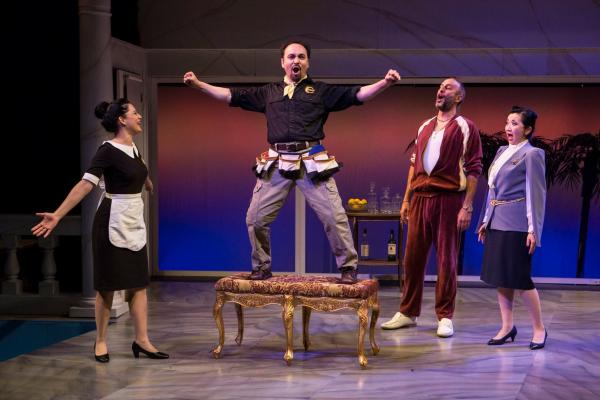JUST AFTER DONALD TRUMP WAS ELECTED, Vice President Mike Pence went to see the hit Broadway musical “Hamilton,” prompting the cast to read a statement from the stage at curtain call stating that they were “alarmed and anxious” that the new administration would not protect the planet or a diverse citizenry.
This set off a Twitter war between Trump and opponents and posed the American theater community as an entity with a strong voice of dissent against Trump’s administration. POTUS-elect tweeted in reply to the cast’s statement that “the theater must always be a safe and special place” and then demanded that the cast apologize.
But the truth is, the theater created by the ancient Greeks was not a “safe” space but rather a strong space of dissent within democracy. For thousands of years, since plays were first staged at the foot of the Acropolis in the Theatre of Dionysus, the theater has been a place where strong opinions about government and culture are voiced within the liminal space of the stage, where they can be heard by the people so that we might form our own opinions.
The New York theater community has had much to say in recent months, with a slate of new and old plays that have taken on the challenge of being a democratic voice of dissent. One of the freshest is Annie Baker’s new play, “The Antipodes,” which opened at the Signature Theatre in April as a part of a residency with the company. This is a play about the importance of plots and the absolute centrality of storytelling in human life.
The entirety of this two-hour absurdist play takes place inside a writing room where a seasoned producer named Sandy has assembled a group of writers to come up with “the next great thing.” We never find out what this thing is—it could be a movie or a television series or any other type of media. In a motivational speech that opens the play, Sandy claims that stories matter and today they might be the most important parts of our lives within the current darkness. We don’t know exactly what Sandy means by this either, but the writers spend the next two hours trying to discover what this story might be. They talk about every type of story from Grimm’s fairy tales to primal myths to warped time-traveling fantasies, and the only way we know time is ticking away is that every time the secretary appears to announce what’s happening outside, she’s wearing a new outfit.
In the end, the writers themselves are left suspended inside their space, with the producer increasingly absent, as though God has left the universe spinning on its own. It’s a deeply troubled ending, with no answer, with no story found, and the audience left asking, “So what stories are important these days?” In an interview with Greta Gerwig in Interview magazine just before “The Antipodes” opened, Baker even questions herself on this, saying, “I still feel like I’ll never write a play again, because it’s so far away and seems so impossible, and I don’t know how you begin a play anymore.”
Asking “What if?”
In a kick-back to the 18th century, one of the most enduring stories of the stage, Mozart’s The Marriage of Figaro, is infused with new life in this political moment when immigrant deportation is daily front-page news. Melissa Crespo’s staging of Vid Guerrerio’s adaptation of the opera, aptly titled ¡Figaro! (90210), boldly confronts immigration reform and income inequality but with a sense of humor, humanity, and historical context that is sorely missing in today’s political climate. “Donald Trump’s election and direct targeting of immigrants made the revolutionary message of equality at the heart of Figaro seem more urgent than ever,” Crespo told Sojourners via email, “and I was determined to bring it back to New York to celebrate how diversity is what has always made America great.”
¡Figaro! (90210) is set in contemporary Los Angeles. The audience is confronted with the story of an impassioned Figaro and his love Susana, who just want to be married and happy like everyone else, but fear deportation as they strive to find a way to stay together. The story is fairly basic: A Count and Countess (representatives of the United States’ 1 percent) have lost the passion in their marriage. The Count turns to young Mexican immigrant maid Susana and, when she won’t comply, threatens her and her fiancée Figaro with deportation. The young couple outwits the scheming Count. In the end, equality is finally found as the Count and Countess recognize the flaws of their ways and are reinvigorated with a love for one another and for all people. Sure, it’s a fantasy, but one that gives a vision of egalitarian politics in a divided world. The bold optimism of this remake testifies that class differences really shouldn’t matter and that love can prevail for all people.
While this adaptation of a classic provides a powerful hope, another piece, just as visionary, examines what happened behind the scenes of the Oslo Peace Accords. Commissioned by Lincoln Center Theater, J.T. Rogers’ political masterpiece “Oslo” was cultivated through two years of research and interviews with participants in the peace talks. He talked to world leaders, Secret Service agents, and diplomats from every realm, bravely asking, according to artistic director André Bishop, “What if?” Then he deftly assembled these characters in the same room and told their story.
Part documentary, part visionary fiction, “Oslo” shows us what might happen when people come together under extreme and difficult circumstances with the goal of making peace. The play tells the story of the Norwegian couple Terje Rød-Larsen and Mona Juul, who relentlessly worked behind the scenes to bring about President Clinton’s Middle East peace plan. They are complicated and difficult characters who are trying to achieve something beyond themselves, something that will last as a testament to deliberative democracy. The play is infused with a sense of humor when it is most needed during the most fraught moments of stressful discussion, and we are introduced to character after character who longs for an end to the troubles of the Middle East. Their worst enemies are history, circumstance, and their own fears of failure. They push on and on, until Rogers brings us to the moment when we must ask ourselves, “Is peace possible?” And if so, how?
Today, so many people around the world feel a loss of hope, but this brings what director Bartlett Sher calls in his foreword to the published play “an infinite possibility for the future.” At the end of the play, Rød-Larsen calls out to us, “My friends, do not look at where we are; look behind you. There! See how far we have come! If we have come this far, through blood, through fear—hatred—how much further can we yet go?”
Conversations that matter
Such dramatic questions create great plays, and this season on Broadway offers a plentiful harvest of them. One is Lucas Hnath’s artful sequel to Henrik Ibsen’s age-old drama “A Doll’s House,” to which Hnath adds the subtitle “Part 2.” In the original—one of the most important modern dramas—Ibsen’s protagonist Nora Helmer chooses to leave her husband, Torvald, after she sees the utter futility of the institution of her Victorian marriage, where the man has all the power. She goes out, letting the door slam behind her, in search of herself, abandoning husband and children, household, and the semblance of normality. Hnath, whose play “The Christians” was one of the most-produced plays in America in the 2016-17 season, artfully brings Helmer back 15 years later to ask the question, “Did my actions even matter?”
Helmer has conversations with the nursemaid, Anne-Marie, who raised her children; with her daughter, whom she no longer knows; and finally, with Torvald himself. What’s discovered in this darkly humorous twist on Ibsen’s original is that our actions do matter. They leave wreckage behind us if we don’t act carefully. Helmer is revealed as a somewhat self-serving hero who brought about a symbolic act of equality for women but who hurt many people in the process. The play asks us to ask ourselves, “How do we act in justified protest and keep the world intact?”
Perhaps that is the question all of us should be asking ourselves these days, and the New York theater scene of 2017, in the democratic spirit of theater’s origins, has helped us do so. While Broadway theater is not accessible to all people, it does influence cultural conversation across the country, through the many policy makers and mass media creators who do see it. These plays all compassionately, with humor and drama, allow the country to see itself. More folks need to have access to these works of dramatic art so that the cultural conversation can truly be egalitarian. We don’t need the theater to apologize, we need it to expand.

Got something to say about what you're reading? We value your feedback!

